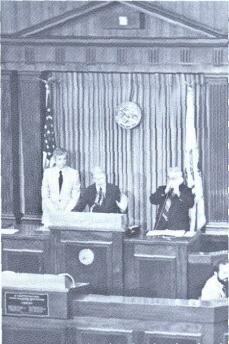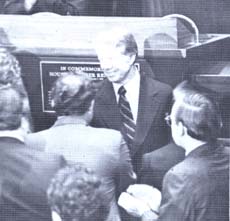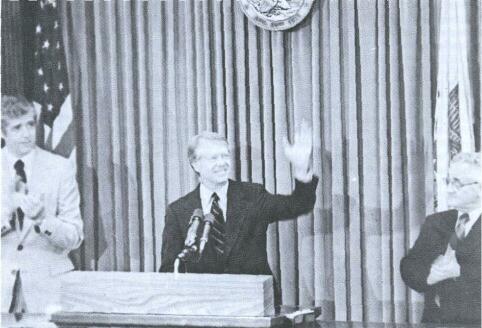By GARY ADKINS
Carter's visit: PRESIDENT Jimmy Carter swept into Illinois May 25 and 26 for some fast but effective political footwork, including an address to a joint session of the legislature in Springfield. But he first paid homage to the clout of the county Democratic "machine" in Chicago, speaking at their annual $100 a plate dinner, and calling theirs the best political organization among Democrats in the country.
Carter cooled the ire of many disgruntled Democrats who felt neglected because he hadn't visited Illinois as President. George Dunne, Democrat, Cook County Chairman, was so wounded by the President's lack of response to fund-raiser invitations last year that he invitied California Gov. Jerry Brown — a possible primary foe of Carter's in 1980 — when Carter turned down this year's speaking invitation. Brown declined and Carter decided to come after all when Chicago gave regular Democrats big turnouts and victories in the March primary. Dunne chided Carter for refusing last year's engagement, but said he was "pleasantly surprised" by Carter's kind words of contrition and congenial demeanor this year. The trip was part of a travel plan suggested by White House advisors to boost the President's sagging popularity, then at its lowest ebb in Carter's 16 months in office. It also included a "regional news conference" where the question of proposed Illinois military base closings was raised. Carter said the eventual fate of Fort Sheridan, Great Lakes Naval Station and Chanute Air Force Base would be determined on a basis of what's "best for the national defense." He explained that it would require "nine or ten months of very careful analysis" including a study "on the economic consequences." Then the President flew to Springfield to address the legislature and speak at a $500 a plate breakfast for Democratic candidate for governor Michael J. Bakalis, a meal which netted $65,000 for Bakalis. The speech before the legislature only the third address there by an American president — departed from a dull written text for some impromptu remarks in favor of women's rights, the administration's urban policy and Carter's accomplishments. The President also commiserated with legislators over the difficulty of government decision-making; his words wafted over egos like a soothing southern breeze as he compared his job to theirs. He then went the limit by fielding questions about foreign and domestic policy from legislators as a happy assemblage of Illinois judicial and executive officials listened, including Gov. James R. Thompson and all the state Supreme Court judges. Conspicuously absent were Lt. Gov. Dave O'Neal and harried Atty. Gen. William J. Scott, the latter under investigation by federal prosecutors on charges of campaign fund abuse. The President's written speech was somewhat more vigorously pro-ERA than his off-the-cuff remarks. Noting the Illinois constitutional provision guaranteeing equal rights to all citizens, the text read: "I hope that you will carry out your historic responsibility by voting to add an Equal Rights Amendment to the Federal Constitution as well." But Carter's actual remarks stopped short of such a request. He said, "What you do here in this chamber in the next few weeks might very well determine whether women do have those equal rights guaranteed in the United States Constitution or whether they do not." He responded to questions from five legislators, each recognized in turn by House Speaker William A. Redmond (D., Bensenville). The first question came from Rep. Jim McPike (D., Alton), and it concerned the loss of Illinois manufacturing jobs and industries to the South, or so-called "sunbelt" states. Carter answered first by admitting that as a former southern governor he had spent "twenty percent of the time recruiting investments from other states." He followed with a plug for a major labor law reform bill then pending in the U.S. Senate. The bill would penalize corporations and other employers who use illegal tactics against unions. Carter said the present National Labor Relations Act has "gaps." 2/July 1978/Illinois Issues Rep. Virginia B. MacDonald (R., Arlington Heights), questioned the inflationary effect of increased social security taxes. The President acknowledged it would "contribute to inflation to some degree" but said there is no alternative in order to keep the social security system in operation for the next 25 years. Then Sen. Arthur L. Berman (D., Chicago) asked the President if his administration had deviated from this country's past "special relationship and total commitment to the state of Israel" by successfully urging fighter plane sales to Saudi Arabia, Egypt and Jordan. Carter adamantly repeated and reaffirmed Herman's words about our "special relationship" with Israel. He argued that arms sales were needed to keep from severing America's relationship with moderate Arab states, thus losing our chance to act as a mediator or "unappreciated postman" in the Middle East. Most Jewish members of the legislature did not applaud the President's words on Israel. A fourth question, by Sen. Bradley M. Glass (R., Northbrook), followed up on Carter's mention of labor law reform. Glass said the current federal proposal would be "disastrous" and "would require a blacklist of those who have violated the [National Labor Relations] Act." The President disagreed. He said the bill was "moderate and modest" and would only affect lawbreakers. The final query came from Rep. Raymond W. Ewell (D., Chicago), who asked if ghettoes could be eligible for relief from the federal government, perhaps as "man-made disaster areas." Carter said Congress has made "notable progress" with passage of a program for hard-core unemployed, including Viet Nam veterans. "There are pockets of unemployment among young people, among black people and women that are still extremely high, and this is on my mind constantly," he said. Carter also said he had "hammered out a comprehensive urban policy for the first time in history," referring to a plan before Congress that gives double the dollars to urban programs and lets states have a bigger say in how the money is spent. After a decorous 35-minutes, President Carter graciously thanked everyone in the chamber, and received warm applause from Democrats and Republicans alike. A hospitable, almost festive mood prevailed. It was the least political interlude in a decidedly political trip; afterward Carter hurried off to praise and raise money for Mike Bakalis.
July 1978/Illinois Issues/25
|
|||||||||||||||||




